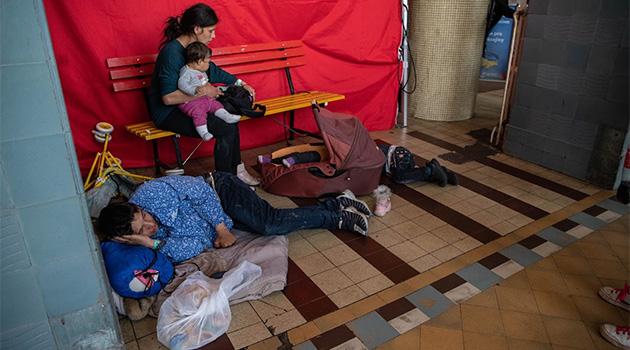RomanoNet: The Czech Government failed to aid Romani Ukrainians seeking temporary protection, we witnessed the double standard

RomanoNet, an umbrella organization of pro-Roma and Romani-led NGOs, has objected to the statement by Czech Government Human Rights Commissioner Klára Šimáčková Laurenčíková that the Czech Republic successfully handled the influx of Ukrainians seeking temporary protection last year. According to the 15 pro-Roma and Romani NGOs, the Czech Republic failed to aid Romani Ukrainians.
“From the perspective of Romani civil society, the state failed as a whole to provide aid to people of color. Many were forced to return to a country where wartime conflict is still underway or to leave for the West, where skin color is not a determinative factor in the provision of assistance. Given all of the above, it is impossible to claim the situation was mastered or resolved,” reads the RomanoNet statement, which was provided to news server Romea.cz by director Michal Miko.
According to the statement, the Czech Government Human Rights Commissioner herself failed at the time. “She was an eyewitness to a situation in which people were sleeping on the ground or in muddy outdoor tents. That was the moment at which she failed as Human Rights Commissioner,” reads the statement, which Romea.cz is publishing in full translation here.
RomanoNet statement on the anniversary of Russia’s occupation of Ukraine
Today we are marking the start of Russia’s barbaric attack on Ukraine, a conflict that has forced many citizens of Ukraine to begin leaving the country for security reasons. It has also forced the very most vulnerable group of inhabitants there to leave their homes in anticipation of receiving adequate, sufficient international protection in other countries, including in the Czech Republic, according to the standards of the international agreements and treaties which the Czech Republic has ratified as member state of the United Nations.
Unfortunately, the reality of the approach taken toward Romani people seeking temporary protection here will remain in all of our minds for the rest of our lives. Believe us, looking at people who have no choice but to sit on the floor of railway station buildings with minimal access to food, hygiene and the necessities of normal life like heat and a place to sleep is quite distressing. Those people got no aid until Romani civil society began to get involved in the issue. Only then were they provided basic humanitarian aid, provided food, and assisted with finding private accommodation providers so that adequate, dignified conditions for the Romani Ukrainians seeking temporary protection could be arranged.
During the last year, we witnessed the double standard applied to the issue of aid to those seeking temporary protection. The state spent a long time investigating whether these people fleeing Ukraine held dual citizenship, which was the crucial data point for providing them emergency assistance. According to research, it turned out that just a small percentage of those people in the Czech Republic were dual citizens. Instead of being given access to adequate housing, Romani Ukrainians seeking temporary protection were sent in droves to detention facilities which felt like prisons in many instances. Outdoor tents were also pitched, and the asylum-seekers living in them were predominantly Romani. In some regional cities, local representatives proved incapable of arranging for dignified conditions even in those camps.
Both local and regional politicians were against housing Romani asylum-seekers in their cities and regions, expressing concern that they would not be able to deal with more “inadaptables“.
We are unable to ignore the Czech Government Human Rights Commissioner and her influence on this situation. At several crucial moments during the last year she did her best to negotiate with the cities, but she failed. She was an eyewitness to a situation in which people were sleeping on the ground or in muddy outdoor tents. That was the moment at which she failed as Human Rights Commissioner.
From the perspective of Romani civil society, the state failed as a whole to provide aid to people of color. Many were forced to return to a country where a wartime conflict is still underway, or to leave for the West, where skin color is not a determinative factor in the provision of such assistance. Given all of the above, it is impossible to claim the situation was mastered or resolved.